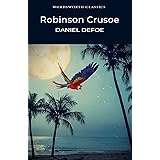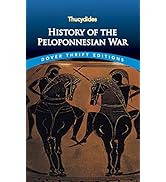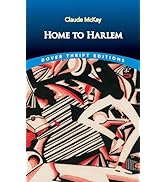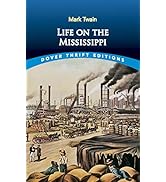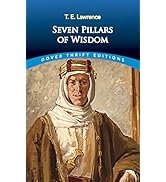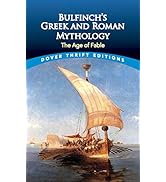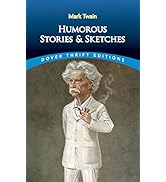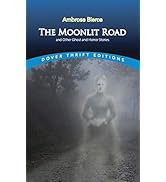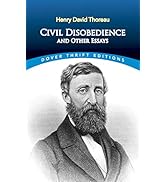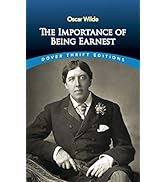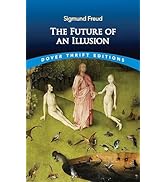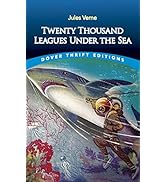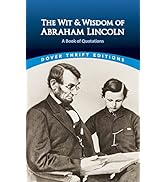
Enjoy fast, free delivery, exclusive deals, and award-winning movies & TV shows with Prime
Try Prime
and start saving today with fast, free delivery
Amazon Prime includes:
Fast, FREE Delivery is available to Prime members. To join, select "Try Amazon Prime and start saving today with Fast, FREE Delivery" below the Add to Cart button.
Amazon Prime members enjoy:- Cardmembers earn 5% Back at Amazon.com with a Prime Credit Card.
- Unlimited Free Two-Day Delivery
- Streaming of thousands of movies and TV shows with limited ads on Prime Video.
- A Kindle book to borrow for free each month - with no due dates
- Listen to over 2 million songs and hundreds of playlists
- Unlimited photo storage with anywhere access
Important: Your credit card will NOT be charged when you start your free trial or if you cancel during the trial period. If you're happy with Amazon Prime, do nothing. At the end of the free trial, your membership will automatically upgrade to a monthly membership.
Buy new:
-10% $5.40$5.40
Ships from: Amazon.com Sold by: Amazon.com
Save with Used - Good
$0.96$0.96

Download the free Kindle app and start reading Kindle books instantly on your smartphone, tablet, or computer - no Kindle device required.
Read instantly on your browser with Kindle for Web.
Using your mobile phone camera - scan the code below and download the Kindle app.

OK
 Audible sample Sample
Audible sample Sample 


Gulliver's Travels (Dover Thrift Editions: Classic Novels) Paperback – Unabridged, September 18, 1996
Purchase options and add-ons
Regarded as the preeminent prose satirist in the English language, Jonathan Swift (1667–1745) intended this masterpiece, as he once wrote Alexander Pope, to "vex the world rather than divert it." Savagely ironic, it portrays man as foolish at best, and at worst, not much more than an ape.
The direct and unadorned narrative describes four remarkable journies of ship's surgeon Lemuel Gulliver, among them, one to the land of Lilliput, where six-inch-high inhabitants bicker over trivialities; and another to Brobdingnag, a land where giants reduce man to insignificance.
Written with disarming simplicity and careful attention to detail, this classic is diverse in its appeal: for children, it remains an enchanting fantasy. For adults, it is a witty parody of political life in Swift's time and a scathing send-up of manners and morals in 18th-century England.
- Print length240 pages
- LanguageEnglish
- PublisherDover Publications
- Publication dateSeptember 18, 1996
- Reading age18 years and up
- Dimensions8.21 x 5.16 x 0.59 inches
- ISBN-100486292738
- ISBN-13978-0486292731
- Lexile measure1150L
"Layla" by Colleen Hoover for $7.19
From #1 New York Times bestselling author Colleen Hoover comes a novel that explores life after tragedy and the enduring spirit of love. | Learn more
Frequently bought together

More items to explore
From the brand

-

Debuting in 1990, the Thrift Editions library of classic literature is a top choice for teachers, students, librarians, and recreational readers around the world. Dover’s longstanding mission of exceptional value has consistently offered excellence in classic fiction, nonfiction, plays, and poetry.
Dover Thrift Editions are low priced, compact (5"x8"), complete and unabridged.
-
-
Are there any collections of stories or poetry in the Dover Thrift Editions?
In addition to single title books, Dover offers books of anthologies in fiction, non-fiction and poetry. Check out our Thrift Editions of short stories, literary collections, poetry, gothic and horror, SciFi/Fantasy, crime/mystery/thrillers and more. Happy Reading!
What formats are the Thrift Editions available in?
All are available in an easy to carry paperback version and most titles are available for the Kindle e-reader.
-
-
-
-
-
-
-
-
-

-
-
-
-
-
-
-
From the Publisher

From the preeminent prose satirist in the English language comes his most famous work
For children it remains an enchanting fantasy; for adults, a witty parody of political life in Swift's time and a scathing send-up of manners and morals in 18th-century England.
“Every man desires to live long, but no man wishes to be old.”
“The tiny Lilliputians surmise that Gulliver's watch may be his god, because it is that which, he admits, he seldom does anything without consulting.”
A great classic recounting the 4 remarkable journeys of ship's surgeon Lemuel Gulliver.
- Part I: A Voyage to Lilliput
- Part II: A Voyage to Brobdingnag
- Part III: A Voyage to Laputa, Balnibarbi, Luggnagg, Glubbdubdrib, and Japan
- Part IV: A Voyage to The Country of the Houyhnhnms

Editorial Reviews
From the Back Cover
Regarded as the preeminent prose satirist in the English language, Jonathan Swift (1667–1745) intended this masterpiece, as he once wrote Alexander Pope, to "vex the world rather than divert it." Savagely ironic, it portrays man as foolish at best, and at worst, not much more than an ape.
The direct and unadorned narrative describes four remarkable journies of ship's surgeon Lemuel Gulliver, among them, one to the land of Lilliput, where six-inch-high inhabitants bicker over trivialities; and another to Brobdingnag, a land where giants reduce man to insignificance.
Written with disarming simplicity and careful attention to detail, this classic is diverse in its appeal: for children, it remains an enchanting fantasy. For adults, it is a witty parody of political life in Swift's time and a scathing send-up of manners and morals in 18th-century England.
Excerpt. © Reprinted by permission. All rights reserved.
Gulliver's Travels
By Jonathan SwiftDover Publications
Copyright © 1996 Jonathan SwiftAll right reserved.
ISBN: 9780486292731
Chapter 1
The Author gives some account of himself and family. His first inducements to travel. He is shipwrecked, and swims for his life, gets safe on shore in the country of Lilliput, is made a prisoner, and carried up the country.
My father had a small estate in Nottinghamshire; I was the third of five sons. He sent me to Emanuel College in Cambridge at fourteen years old, where I resided three years, and applied myself close to my studies: but the charge of maintaining me (although I had a very scanty allowance) being too great for a narrow fortune, I was bound apprentice to Mr. James Bates, an eminent surgeon in London, with whom I continued four years; and my father now and then sending me small sums of money, I laid them out in learning navigation, and other parts of the mathematics, useful to those who intend to travel, as I always believed it would be some time or other my fortune to do. When I left Mr. Bates, I went down to my father; where, by the assistance of him and my uncle John, and some other relations, I got forty pounds, and a promise of thirty pounds a year to maintain me at Leyden: there I studied physic two years and seven months, knowing it would be useful in long voyages.
Soon after my return from Leyden, I was recommended, by my good master Mr. Bates, to be surgeon to the Swallow, Captain Abraham Pannell commander; with whom I continued three years and a half, making a voyage or two into the Levant, and some other parts. When I came back, I resolved to settle in London, to which Mr. Bates, my master, encouraged me, and by him I was recommended to several patients. I took part of a small house in the Old Jury; and being advised to alter my condition, I married Mrs. Mary Burton, second daughter to Mr. Edmund Burton, hosier in Newgate-street, with whom I received four hundred pounds for a portion.
But, my good master Bates dying in two years after, and I having few friends, my business began to fail; for my conscience would not suffer me to imitate the bad practice of too many among my brethren. Having therefore consulted with my wife, and some of my acquaintance, I determined to go again to sea. I was surgeon successively in two ships, and made several voyages, for six years, to the East and West-Indies, by which I got some addition to my fortune. My hours of leisure I spent in reading the best authors, ancient and modern, being always provided with a good number of books; and when I was ashore, in observing the manners and dispositions of the people, as well as learning their language, wherein I had a great facility by the strength of my memory.
The last of these voyages not proving very fortunate, I grew weary of the sea, and intended to stay at home with my wife and family. I removed from the Old Jury to Fetter-Lane, and from thence to Wapping, hoping to get business among the sailors, but it would not turn to account. After three years expectation that things would mend, I accepted an advantageous offer from Captain William Prichard, master of the Antelope, who was making a voyage to the South-Sea. We set sail from Bristol May 4, 1699, and our voyage at first was very prosperous.
It would not be proper, for some reasons, to trouble the readers with the particulars of our adventures in those seas: let it suffice to inform him, that in our passage from thence to the East-Indies, we were driven by a violent storm to the north-west of Van Diemen’s Land. By an observation, we found ourselves in the latitude of 30 degrees 2 minutes south. Twelve of our crew were dead by immoderate labour and ill food, the rest were in a very weak condition. On the fifth of November, which was the beginning of summer in those parts, the weather being very hazy, the seamen spied a rock, within half a cable’s length of the ship; but the wind was so strong, that we were driven directly upon it, and immediately split. Six of the crew, of whom I was one, having let down the boat into the sea, made a shift to get clear of the ship, and the rock. We rowed by my computation about three leagues, till we were able to work no longer, being already spent with labour while we were in the ship. We therefore trusted ourselves to the mercy of the waves, and in about half an hour the boat was overset by a sudden flurry from the north. What became of my companions in the boat, as well as of those who escaped on the rock, or were left in the vessel, I cannot tell; but conclude they were all lost. For my own part, I swam as fortune directed me, and was pushed forward by wind and tide. I often let my legs drop, and could feel no bottom: but when I was almost gone, and able to struggle no longer, I found myself within my depth; and by this time the storm was much abated. The declivity was so small, that I walked near a mile before I got to the shore, which I conjectured was about eight o’clock in the evening. I then advanced forward near half a mile, but could not discover any sign of houses or inhabitants; at least I was in so weak a condition, that I did not observe them. I was extremely tired, and with that, and the heat of the weather, and about half a pint of brandy that I drank as I left the ship, I found myself much inclined to sleep. I lay down on the grass, which was very short and soft, where I slept sounder than ever I remember to have done in my life, and, as I reckoned, above nine hours; for when I awaked, it was just day-light. I attempted to rise, but was not able to stir: for, as I happened to lie on my back, I found my arms and legs were strongly fastened on each side to the ground; and my hair, which was long and thick, tied down in the same manner. I likewise felt several slender ligatures across my body, from my armpits to my thighs. I could only look upwards; the sun began to grow hot, and the light offended my eyes. I heard a confused noise about me, but in the posture I lay, could see nothing except the sky. In a little time I felt something alive moving on my left leg, which advancing gently forward over my breast, came almost up to my chin; when bending my eyes downwards as much as I could, I perceived it to be a human creature not six inches high, with a bow and arrow in his hands, and a quiver at his back. In the mean time, I felt at least forty more of the same kind (as I conjectured) following the first. I was in the utmost astonishment, and roared so loud, that they all ran back in a fright; and some of them, as I was afterwards told, were hurt with the falls they got by leaping from my sides upon the ground. However, they soon returned, and one of them, who ventured so far as to get a full sight of my face, lifting up his hands and eyes by way of admiration, cried out in a shrill but distinct voice, Hekinah degul: the others repeated the same words several times, but I then knew not what they meant. I lay all this while, as the reader may believe, in great uneasiness: at length, struggling to get loose, I had the fortune to break the strings, and wrench out the pegs that fastened my left arm to the ground; for, by lifting it up to my face, I discovered the methods they had taken to bind me, and at the same time, with a violent pull, which gave me excessive pain, I a little loosened the strings that tied down my hair on the left side, so that I was just able to turn my head about two inches. But the creatures ran off a second time, before I could seize them; whereupon there was a great shout in a very shrill accent, and after it ceased, I heard one of them cry aloud, Tolgo phonac; when in an instant I felt above an hundred arrows discharged on my left hand, which pricked me like so many needles; and besides they shot another flight into the air, as we do bombs in Europe, whereof many, I suppose, fell on my body (though I felt them not) and some on my face, which I immediately covered with my left hand. When this shower of arrows was over, I fell a groaning with grief and pain, and then striving again to get loose, they discharged another volley larger than the first, and some of them attempted with spears to stick me in the sides; but, by good luck, I had on me a buff jerkin, which they could not pierce. I thought it the most prudent method to lie still, and my design was to continue so till night, when, my left hand being already loose, I could easily free myself: and as for the inhabitants, I had reason to believe I might be a match for the greatest armies they could bring against me, if they were all of the same size with him that I saw. But fortune disposed otherwise of me. When the people observed I was quiet, they discharged no more arrows; but, by the noise I heard, I knew their numbers increased; and about four yards from me, over against my right ear, I heard a knocking for above an hour, like that of people at work; when turning my head that way, as well as the pegs and strings would permit me, I saw a stage erected, about a foot and a half from the ground, capable of holding four of the inhabitants, with two or three ladders to mount it: from whence one of them, who seemed to be a person of quality, made me a long speech, whereof I understood not one syllable. But I should have mentioned, that before the principal person began his oration, he cried out three times, Langro dehul san (these words and the former were afterwards repeated and explained to me). Whereupon immediately about fifty of the inhabitants came, and cut the strings that fastened the left side of my head, which gave me the liberty of turning it to the right, and of observing the person and gesture of him that was to speak. He appeared to be of a middle age, and taller than any of the other three who attended him, whereof one was a page that held up his train, and seemed to be somewhat longer than my middle finger; the other two stood one on each side to support him. He acted every part of an orator, and I could observe many periods of threatenings, and others of promises, pity, and kindness. I answered in a few words, but in the most submissive manner, lifting up my left hand and both my eyes to the sun, as calling him for a witness; and being almost famished with hunger, having not eaten a morsel for some hours before I left the ship, I found the demands of nature so strong upon me, that I could not forbear showing my impatience (perhaps against the strict rules of decency) by putting my finger frequently on my mouth, to signify that I wanted food. The Hurgo (for so they call a great lord, as I afterwards learnt) understood me very well. He descended from the stage, and commanded that several ladders should be applied to my sides, on which above an hundred of the inhabitants mounted, and walked towards my mouth, laden with baskets full of meat, which had been provided, and sent thither by the King’s orders, upon the first intelligence he received of me. I observed there was the flesh of several animals, but could not distinguish them by the taste. There were shoulders, legs, and loins, shaped like those of mutton, and very well dressed, but smaller than the wings of a lark. I ate them by two or three at a mouthful, and took three loaves at a time, about the bigness of musket bullets. They supplied me as they could, showing a thousand marks of wonder and astonishment at my bulk and appetite. I then made another sign mat I wanted drink. They found by my eating that a small quantity would not suffice me, and being a most ingenious people, they slung up with great dexterity one of their largest hogsheads, then rolled it towards my hand, and beat out the top; I drank it off at a draught, which I might well do, for it did not hold half a pint, and tasted like a small wine of Burgundy, but much more delicious. They brought me a second hogshead, which I drank in the same manner, and made signs for more, but they had none to give me. When I had performed these wonders, they shouted for joy, and danced upon my breast, repeating several times as they did at first, Hekinah degul. They made me a sign that I should throw down the two hogsheads, but first warning the people below to stand out of the way, crying aloud, Borach mivola, and when they saw the vessels in the air, there was an universal shout of Hekinah degul. I confess I was often tempted, while they were passing backwards and forwards on my body, to seize forty or fifty of the first that came in my reach, and dash them against the ground. But the remembrance of what I had felt, which probably might not be the worst they could do, and the promise of honour I made them, for so I interpreted my submissive behaviour, soon drove out these imaginations. Besides, I now considered myself as bound by the laws of hospitality to a people who had treated me with so much expense and magnificence. However, in my thoughts I could not sufficiently wonder at the intrepidity of these diminutive mortals who durst venture to mount and walk upon my body, while one of my hands was at liberty, without trembling at the very sight of so prodigious a creature as I must appear to them. After some time, when they observed that I made no more demands for meat, there appeared before me a person of high rank from his Imperial Majesty. His Excellency, having mounted on the small of my right leg, advanced forwards up to my face, with about a dozen of his retinue. And producing his credentials under the Signet Royal, which he applied close to my eyes, spoke ten minutes, without any signs of anger, but with a kind of determinate resolution; often pointing forwards, which, as I afterwards found, was towards the capital city, about half a mile distant, whither it was agreed by his Majesty in council that I must be conveyed. I answered in few words, but to no purpose, and made a sign with my hand that was loose, putting it to the other (but over his Excellency’s head, for fear of hurting him or his train) and then to my own head and body, to signify that I desired my liberty. It appeared that he understood me well enough, for he shook his head by way of disapprobation, and held his hand in a posture to show that I must be carried as a prisoner. However, he made other signs to let me understand that I should have meat and drink enough, and very good treatment. Whereupon I once more thought of attempting to break my bonds, but again, when I felt the smart of their arrows upon my face and hands, which were all in blisters, and many of the darts still sticking in them, and observing likewise that the number of my enemies increased, I gave tokens to let them know that they might do with me what they pleased. Upon this the Hurgo and his train withdrew with much civility and cheerful countenances. Soon after I heard a general shout, with frequent repetitions of the words, Peplom selan, and I felt great numbers of the people on my left side relaxing the cords to such a degree, that I was able to turn upon my right, and to ease myself with making water; which I very plentifully did, to the great astonishment of the people, who conjecturing by my motions what I was going to do, immediately opened to the right and left on that side, to avoid the torrent which fell with such noise and violence from me. But before this, they had daubed my face and both my hands with a sort of ointment very pleasant to the smell, which in a few minutes removed all the smart of their arrows. These circumstances, added to the refreshment I had received by their victuals and drink, which were very nourishing, disposed me to sleep. I slept about eight hours, as I was afterwards assured; and it was no wonder, for the physicians, by the Emperor’s order, had mingled a sleepy potion in the hogsheads of wine.
It seems that upon the first moment I was discovered sleeping on the ground after my landing, the Emperor had early notice of it by an express; and determined in council that I should be tied in the manner I have related (which was done in the night while I slept), that plenty of meat and drink should be sent me, and a machine prepared to carry me to the capital city.
This resolution perhaps may appear very bold and dangerous, and I am confident would not be imitated by any prince in Europe on the like occasion; however, in my opinion, it was extremely prudent, as well as generous. For supposing these people had endeavoured to kill me with their spears and arrows while I was asleep, I should certainly have awaked with the first sense of smart, which might so far have roused my rage and strength, as to have enabled me to break the strings wherewith I was tied; after which, as they were not able to make resistance, so they could expect no mercy.
These people are most excellent mathematicians, and arrived to a great perfection in mechanics by the countenance and encouragement of the Emperor, who is a renowned patron of learning. This prince hath several machines fixed on wheels for the carriage of trees and other great weights. He often builds his largest men-of-war, whereof some are nine foot long, in the woods where the timber grows, and has them carried on these engines three or four hundred yards to the sea. Five hundred carpenters and engineers were immediately set at work to prepare the greatest engine they had. It was a frame of wood raised three inches from the ground, about seven foot long and four wide, moving upon twenty-two wheels. The shout I heard was upon the arrival of this engine, which it seems set out in four hours after my landing. It was brought parallel to me as I lay. But the principal difficulty was to raise and place me in this vehicle. Eighty poles, each of one foot high, were erected for this purpose, and very strong cords of the bigness of packthread were fastened by hooks to many bandages, which the workmen had girt round my neck, my hands, my body, and my legs. Nine hundred of the strongest men were employed to draw up these cords by many pulleys fastened on the poles, and thus, in less than three hours, I was raised and slung into the engine, and there tied fast. All this I was told, for while the whole operation was performing, I lay in a profound sleep, by the force of that soporiferous medicine infused into my liquor. Fifteen hundred of the emperor’s largest horses, each about four inches and a half high, were employed to draw me towards the metropolis, which, as I said, was half a mile distant.
About four hours after we began our journey, I awaked by a very ridiculous accident; for the carriage being stopped a while to adjust something that was out of order, two or three of the young natives had the curiosity to see how I looked when I was asleep; they climbed up into the engine, and advancing very softly to my face, one of them, an officer in the Guards, put the sharp end of his half-pike a good way up into my left nostril, which tickled my nose like a straw, and made me sneeze violently: whereupon they stole off unperceived, and it was three weeks before I knew the cause of my awaking so suddenly. We made a long march the remaining part of that day, and rested at night with five hundred guards on each side of me, half with torches, and half with bows and arrows, ready to shoot e if I should offer to stir. The next morning at sunrise we continued our march, and arrived within two hundred yards of the city gates about noon. The Emperor, and all his court, came out to meet us; but his great officers would by no means suffer his Majesty to endanger his person by mounting on my body.
At the place where the carriage stopped, there stood an ancient temple, esteemed to be the largest in the whole kingdom, which having been polluted some years before by an unnatural murder, was, according to the zeal of those people, looked on as profane, and therefore had been applied to common uses, and all the ornaments and furniture carried away. In this edifice it was determined I should lodge. The great gate fronting to the north was about four foot high, and almost two foot wide, through which I could easily creep. On each side of the gate was a small window not above six inches from the ground: into that on the left side, the King’s smiths conveyed fourscore and eleven chains, like those that hang to a lady’s watch in Europe, and almost as large, which were locked to my left leg with six and thirty padlocks. Over against this temple, on t’other side of the great highway, at twenty foot distance, there was a turret at least five foot high. Here the emperor ascended with many principal lords of his court, to have an opportunity of viewing me, as I was told, for I could not see them. It was reckoned that above an hundred thousand inhabitants came out of the town upon the same errand; and in spite of my guards, I believe there could not be fewer than ten thousand, at several times, who mounted upon my body by the help of ladders. But a proclamation was soon issued to forbid it upon pain of death. When the workmen found it was impossible for me to break loose, they cut all the strings that bound me; whereupon I rose up with as melancholy a disposition as ever I had in my life. But the noise and astonishment of the people at seeing me rise and walk, are not to be expressed. The chains that held my left leg were about two yards long, and gave me not only the liberty of walking backwards and forwards in a semicircle; but, being fixed within four inches of the gate, allowed me to creep in, and lie at my full length in the temple.
All new material copyright ©1999 by Tom Doherty Associates, LLC.
Continues...
Excerpted from Gulliver's Travelsby Jonathan Swift Copyright © 1996 by Jonathan Swift. Excerpted by permission.
All rights reserved. No part of this excerpt may be reproduced or reprinted without permission in writing from the publisher.
Excerpts are provided by Dial-A-Book Inc. solely for the personal use of visitors to this web site.
Product details
- Publisher : Dover Publications; Unabridged edition (September 18, 1996)
- Language : English
- Paperback : 240 pages
- ISBN-10 : 0486292738
- ISBN-13 : 978-0486292731
- Reading age : 18 years and up
- Lexile measure : 1150L
- Item Weight : 6.4 ounces
- Dimensions : 8.21 x 5.16 x 0.59 inches
- Best Sellers Rank: #81,594 in Books (See Top 100 in Books)
- #2,613 in Classic Literature & Fiction
- #6,124 in Literary Fiction (Books)
- Customer Reviews:
About the authors

Paper Mill Press is proud to present a timeless collection of unabridged literary classics to a twenty-first century audience. Each original master work is reimagined into a sophisticated yet modern format with custom suede-like metallic foiled covers.

Born in 1667, Jonathan Swift was an Irish writer and cleric, best known for his works Gulliver s Travels, A Modest Proposal, and A Journal to Stella, amongst many others. Educated at Trinity College in Dublin, Swift received his Doctor of Divinity in February 1702, and eventually became Dean of St. Patrick s Cathedral in Dublin. Publishing under the names of Lemeul Gulliver, Isaac Bickerstaff, and M. B. Drapier, Swift was a prolific writer who, in addition to his prose works, composed poetry, essays, and political pamphlets for both the Whigs and the Tories, and is considered to be one of the foremost English-language satirists, mastering both the Horatian and Juvenalian styles. Swift died in 1745, leaving the bulk of his fortune to found St. Patrick s Hospital for Imbeciles, a hospital for the mentally ill, which continues to operate as a psychiatric hospital today.
Jonathan Swift(1667 1745), a poet, satirist, and clergyman, published many satirical works, among them A Modest Proposal. Robert DeMaria, Jr. is Henry Noble McCracken Professor of English at Vassar College. He has published widely on seventeenth- and eighteenth-century literature.
Customer reviews
Customer Reviews, including Product Star Ratings help customers to learn more about the product and decide whether it is the right product for them.
To calculate the overall star rating and percentage breakdown by star, we don’t use a simple average. Instead, our system considers things like how recent a review is and if the reviewer bought the item on Amazon. It also analyzed reviews to verify trustworthiness.
Learn more how customers reviews work on AmazonReviews with images
-
Top reviews
Top reviews from the United States
There was a problem filtering reviews right now. Please try again later.
parts were difficult to understand. I really enjoyed all of the satire and the parts finding fault with human behavior in traveling to not understand different cultures! I may have missed when you explained how Gullver got his his eye sight back.
Isaac Asimov, the distinguished writer, scientist, and Sci-fi buff, speculates that the made-up languages in Gulliver's Travels are basically nonsense; then he turns around and speculates that Lilliput is a corruption of "little bit". Good guess! - but maybe it's "little part" or "little pint"? Asimov also gives a other cases where highly plausible decipherments can be made.
Interestingly, Swift's made-up languages often have a definite Italian ring. Swift himself says so much when commenting on the language of Laputa. Did Swift have a particularly admiration for Italian? Did he study it?
It is usually assumed that most events and characters in Gulliver are veiled satires on England, and its misrule of Ireland. Perhaps. But maybe Swift was also poking fun at the Italian states. The "good old days" for which Swift pined may then be those of the Roman empire.
It is often claimed that the fourth book is the best, and the third book the weakest. I disagree! Possibly from a purely stylistic standpoint the fourth book, on the horse-people, IS the best. But this is not enough to make it the most interesting. The Houyhnhnms represent Swift's idea of purely rational, benign beings. They don't lie, and have virtually no crime. But frankly, they are boring! They appear to have neither dreams nor aspirations, and little imagination. They spend much of their time in busy-work - apparently so as to stay out of trouble, in the manner of certain monastic orders. Perhaps the real trouble is that humans have a limited capacity for imagining perfect goodness. Look at the divine comedy triptych painted by Bosch. Which is the most interesting panel? The one on heaven? I don't think so!
The third book (the one about the flying island of Laputa) contains a wealth of ideas - even if hastily written. Asimov points out that, unlike the other books, in the third book Swift takes considerable pains to explain "the marvelous" in scientific terms -- at least to the extent such explanations are possible. This is a hallmark of science fiction, as opposed to fantasy. A strong case can be made for Swift as the first true sci-fi writer. Consider, for example, his amazingly prophetic description of the two moons of Mars.
Here is another example of Swifts amazing prescience. It is from Laputa, and illustrates the major concerns of Laputa's scientists:
"These people are under continual Disquietudes, never enjoying a minutes Peace of Mind; and their disturbances proceed from causes which very little effect the rest of Mortals. ... That, the Earth very narrowly escaped a Brush from the last Comet, which would have infallibly reduced it to Ashes; and that the next, which they have calculated for One and Thirty years hence, will probably destroy us."
Don't we incessantly hear about the grave dangers comets and asteroids pose to us?
First, Gulliver is shipwrecked onto the shores of Lilliput, and finds himself tied down by hundreds of tiny ropes. He makes contact with the people native to the island, and is shocked to find them only a few inches tall. He is taken into servitude by the tiny race and learns their language. He soon finds out of another civilization of little people across the small body of water that is a sea to them. They were originally members of the same nation, but they rebelled over a dispute over which end of an egg should be cracked. Political issues lead to plans of Gulliver's execution, but he is informed by a friend of this and moves to the other civilization. Here he repairs a boat of his size that is found in the water and leaves the island, taking a few small animals to use as proof of his journeys.
For his second adventure, Gulliver is stranded on Brobdingnag, and island of giants. Here, even the smallest man is the size of a house. He is discovered by a farming family, and is put on display across the country as a novelty. The family makes its way to the capital and sells Gulliver to the queen. He spends many months as a joke and in severe danger by even the smallest creatures. He is nearly killed by rats and wasps, giving him a true sense of his powerlessness. The king of Brobdingnag inquires with him about the state of the world off the island, and is in tears with laughter. He finds the squabbles of such a small race endearing and cannot take any of it seriously. The king has created a society where free speech is not a right given to the people and finds it absurd to be any other way. Gulliver's stay is interrupted by a bird carrying him off into the ocean, where he finds a ship and gains passage back to England.
Gulliver only stays home for two months before he goes out into the sea once again - and is attacked by pirates. After offending the captain, he is set free into the ocean with only a boat and four days of food. He makes his way to an island and discovers a floating landmass nearby. He hails it and is brought up into the island and meets the king. The people of the island, Laputa, are constantly absorbed in thought, and care only for mathematics and music. Their entire society spurns practicality and suffers for it, houses are poorly made and crops barely grow. Gulliver is sent to a scientific conference, and discovers hundreds of experiments that are all heavily impractical and most are failures. One such presentation hopes to propagate a breed of hairless sheep. He leaves peacefully by travelling to Japan through trade routes.
For his final voyage, Gulliver captains his own ship. That is, until a mutiny left him on the shores of Houyhnhnm. He discovers a race of humanoid savages and a race of intelligent horses. The horses think he is one of the savages, "Yahoos," but are surprised by the civility he displays. He is taken to the leader of their village, and is instructed in their language. To the disbelief of all the horses, "Houyhnhnms", he is as intelligent as they are. Their leader inquires about his world, and is stunned to find that the roles of horses and men are reversed. He is disgusted by the society Gulliver reveals. The society of the Houyhnhnms is much friendlier, but less personal. They do what needs to be done to survive, and don't nurture hate nor encourage violence. Gulliver's eyes are opened by the Houyhnhnms, and finds himself progressively more disgusted by humanity. It slowly dawns on Gulliver that the repulsive Yahoos are actually humans who arrived on the island far earlier. He falls in love with the society of the Houyhnhnms and no longer wishes to leave the island. He is sadly forced off of the island and tries to live in seclusion on a nearby one. He is discovered by sailors and taken aboard against his will. The captain is a very kind and patient man and cares for Gulliver despite his repulsion.
When he arrives home he is disgusted by his own family and can't stand their presence for over a year, instead conversing with a pair of horses he purchased. He ends with a statement about how these islands he visited are technically property of England but that he sees no advantage to colonizing any of them. He desires to protect the Houyhnhnms most of all, as their noble society is something he believes we should all strive for.
While I found the book fairly interesting at times, the language used was hard to follow, and it often went off onto rants that were both uninteresting and irrelevant. However, I do know that this book was intended to be a satire, and the boredom experienced may be an intentional act by Swift. I found many of the ways these societies operated purely ridiculous and totally unsustainable, but perhaps this was also intentional. I would assume that this was done to make me think about WHY I found them ridiculous, and if it was the product of close mindedness or fact. After looking into the story more when writing this, I found many small hints that indicate the satirical tone of the book.
While the first reading was a little grueling, the review and discovery of small hints was very enjoyable. I would recommend this book to anyone with the perseverance to get through the dry parts, as the rest of it is truly interesting.
Top reviews from other countries
Não é tão emocionante, mas reflexiva.
Livro em ótimo estado.
Gulliver's travels is about a man called Gulliver, who was a surgeon in England but became a sailor. His adventures and voyages were to 4 different islands, encountering different species and people very different to humankind.
His first voyage was to Lilliput, where the book starts. It was an island where everyone was tiny and he was a giant. He spent a while there and learnt the language whilst being accommodated by the king and visiting him regularly. The tiny people (Lilliputians) thought to use him as a weapon to fight off their enemies, the Blefuscu army. He was given a set of rules to follow. Eventually, Gulliver left this island.
His second voyage was to Brobdingnag when he was pushed off-course trying to return to England. This island was a land of giants, where he was tiny. He was taken in by a family of farmers and looked after and once again visited the king and queen as he was something they had never seen before. The farmer's daughter, who he called Glumdalclitch - little nurse - looked after him and put him in a box as his home. One day an eagle picked up his box and flew him to the sea, then dropped him in the sea inside his box, left to float.
He then is picked up by an English ship who found his floating box in the sea. He goes back to his wife and children for a while then sets out for sea again. Whilst out at sea, he is approached by a pirate ship and is forced off his boat by himself on a rowboat to an island.
In the third voyage, he goes to a floating island called Laputa. In this island, the people there excelled in astronomy, and based all things off of shapes, maths and music. The people here have tails and an odd appearance. He then through Glubbdubdrib, a place of sorcerers on his way to Japan, to return back home to England.
In the fourth and final voyage, he goes to an island of horses, called Houyhnhnms, and human-like apes - called Yahoos. These Houyhnhnms are very different to humans, they are kind and lack evil and have wisdom that humans do not. They live very differently with no lying or arguments. The Yahoos are very violent and savage beasts with claws who they stay away from and despise. Even Yahoos despise other Yahoos, they are a very weird race. The Houyhnhnms think Gulliver is a Yahoo, from a similar appearance but realise he is different in nature. He stays at this island for years, learning to live like them and talk like them, and grows a hatred for humans/yahoos. He wants to stay but one day he is forced to leave as he is similar to a yahoo but he tries hard to stay there. He leaves and goes to a small island near it where there are a portuguese-speaking tribe, who take him back to England, even though he hates them and doesn’t want to go back.
He returns to his wife and children after 5 years, who are happy to see him. Gulliver, on the other hand, is disgusted by them and sees them as Yahoos, not being able to stand their smell. He takes years to get back to living with humans and distances himself from his family and friends, and bought horses to take care of and spend most of his time with, as they were like Houyhnhnms. He seems to have learnt some wisdom and a valuable lesson from this wiser species and closes the book by hoping the yahoos (humans) around him would go to different virtue lands like him.
Reviewed in India on May 14, 2023

Ce livre est de la collection Oxford World's Classic.
Je l'avais lu en français. Je le lis en anglais et j'en tire beaucoup plus d'avantage. Parce que je suis plus attentif.




![Robinson Crusoe [Paperback]](https://images-na.ssl-images-amazon.com/images/I/71V2rvkEmLL._AC_UL116_SR116,116_.jpg)





